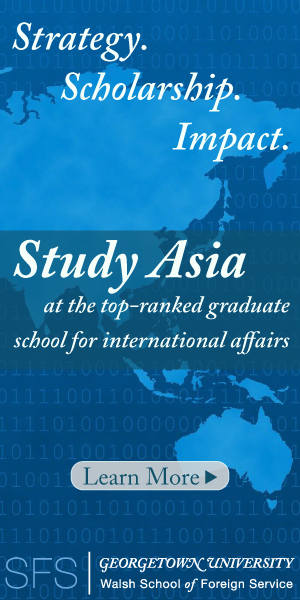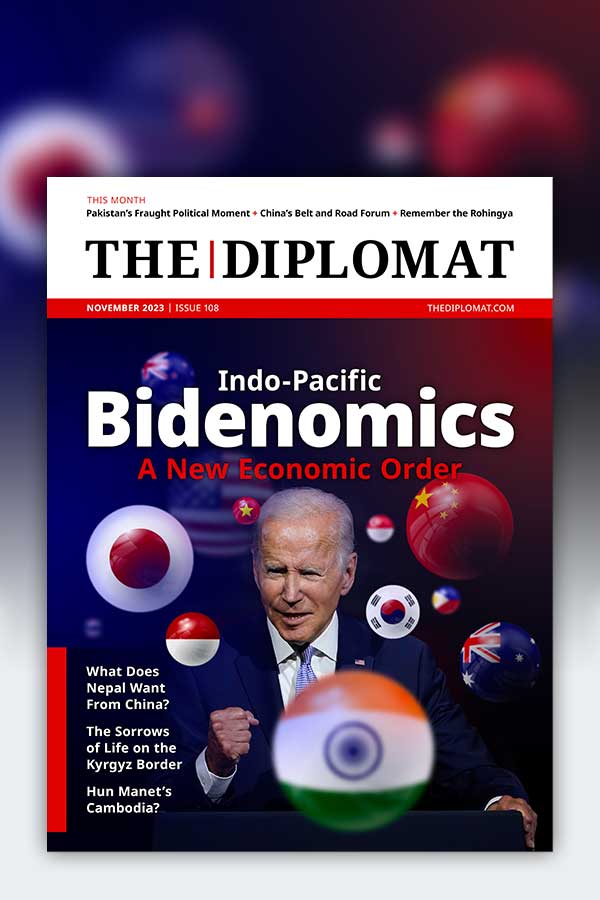| Welcome to the latest issue of Diplomat Brief. This week our top story explores a controversial ruling from Indonesia’s Constitutional Court that could reshape the country’s politics for decades to come. We also have an interview with Temur Umarov, a fellow at the Carnegie Russia Eurasia Center, on Russia, China, and Central Asia amid the war in Ukraine. |
| Story of the week | ![[object Object]](https://thediplomat.com/diplomat-brief/2023/vol47/images/feature.jpg?v=2) | Politics An Indonesian Constitutional Court Scandal and an Election in JeopardyWhat Happened: On October 16, Indonesia’s Constitutional Court ruled that candidates for president or vice president could overcome the minimum age requirement of 40 if they had previously held elected office. The ruling opened the door for current President Joko Widodo’s son, 36-year-old Gibran Rakabuming Raka, to run as vice president on Prabowo Subianto’s ticket, which was made official just a week later. The decision sparked outrage over what critics saw as a dynastic power play by Jokowi, who must step down next year due to term limits. Adding to the intrigue, the court’s chief justice, Anwar Usman, is Jokowi’s brother-in-law. For failing to recuse himself in the case, Usman was stripped of his post as chief justice by the court’s ethics panel, although he remains on the court. Our Focus: The Indonesian Legal Aid Foundation branded the Honorary Council’s verdict “a problematic decision, harming equality before the law and hurting the sense of justice of citizens” because Usman was left on the court. More importantly, the verdict allowing Gibran to run for vice president remains in force. The questionable ethics of the decision will likely be a focal point for the campaign season. “The narrative about Gibran’s candidacy being illegitimate will continue to be voiced, especially on social media, with the aim of influencing voters and gaining support,” Titi Anggraini, a constitutional law lecturer at Universitas Indonesia, told The Diplomat. What Comes Next: Not only are there concerns about a Jokowi dynasty, but the saga has called into question the judiciary’s ability to fairly hear election-related cases.“It raises concerns on whether the Constitutional Court may rule fairly and objectively next year if the losing candidates file a legal challenge against the winner, questioning the fairness of the electoral process,” Alex Arifianto, a research fellow at the S. Rajaratnam School of International Studies in Singapore, said. The controversy could prove particularly problematic if the Prabowo-Gibran ticket wins: “We could see wide-scale demonstrations across Indonesia and great civil unrest if people refuse to accept the new presidency and vice-presidency as legal,” warned Berlian Simarmata, a law lecturer at Santo Thomas Catholic University in Medan. Read this story |
| Behind the News | INTERVIEW Temur UmarovTemur Umarov, an expert on China and Central Asia and a fellow at the Carnegie Russia Eurasia Center, on regional governments’ two “contradictory goals” in diplomatic strategy: “A) distance themselves from Moscow to the extent that the international community would not associate Central Asian states with Russia’s aggression, and B) ensure that the Kremlin doesn’t perceive that the region’s countries are turning their backs on Moscow.” Read the interview |
| This Week in Asia | Northeast Asia Last Chance for Taiwan’s OppositionLate last week, two of the three opposition candidates running in Taiwan’s 2024 presidential election dropped a bombshell: KMT candidate Hou Yu-ih and TPP candidate Ko Wen-je said they had agreed to form a joint ticket, with the presidential candidate to be determined by an aggregate of polls. The deal fell apart just days later, with Ko accusing the KMT of fudging the numbers to ensure Hou won out. After over a month of KMT-TPP talks, neither candidate is willing to play second fiddle to the other, although it’s clear that neither stands a chance of winning with the other in the race. With the deadline for registering the tickets on Friday, time is running out for an agreement. Find out more | South Asia India Adjusts to a New President in MaldivesWhen Mohamed Muizzu won Maldives’ presidential election on September 30, it was an alarming development for New Delhi. Muizzu had campaigned using the “India Out” slogan, promising to reduce India’s influence in the country. Since being inaugurated on November 17, he’s moved quickly to do just that. Muizzu has already demanded that India remove military personnel stationed in Maldives. India has yet to respond, but it’s clear New Delhi will have to adjust to a new normal in its Indian Ocean neighbor. Find out more | Southeast Asia Philippines Calls for More Regional Cooperation on SCS DisputesPresident Ferdinand Marcos Jr. said this week that his government has approached Vietnam and Malaysia to discuss a separate code of conduct on the South China Sea, after limited progress in the regional agreement being negotiated with China. During a speech in Hawaiʻi, the Philippine leader said that the situation in the disputed waterway “has become more dire” as China has increased its assertive behavior, resulting in a string of physical encounters with Philippine vessels. Given this belligerence, and the glacial progress of the China-ASEAN Code of Conduct on the South China Sea, now more than two decades in the making, Marcos may be calculating that there is more to be gained from investing time and energy in bilateral talks with fellow claimants. Find out more | Central Asia Winter Arrives, Central Asia WorriesAs winter settles across the northern hemisphere, Central Asia enters a period of worried hibernation. Temperatures in parts of the region, particularly Kazakhstan, can drop to minus 40 degrees Celsius for weeks at a time, and the energy networks that provide heating have an alarming tendency to black out under stress. A transition to sustainable heating systems is an expensive endeavor, but not as expensive as maintaining the unstable status quo. Find out more |
| Visualizing APAC |  | A migrant worker climbs into the back of a lorry. In Singapore, it is legal for migrant workers – and only migrant workers – to ride unsecured in the back of trucks made to ferry cargo, not people. See the full picture |
| Word of the Week | Security 巡飞弹Xúnfēidàn, Mandarin for “loitering munitions,” a topic of great interest for Chinese military strategists watching the Russia-Ukraine war. Find out more |
|  |

![[object Object]](https://thediplomat.com/diplomat-brief/2023/vol47/images/feature.jpg?v=2)

